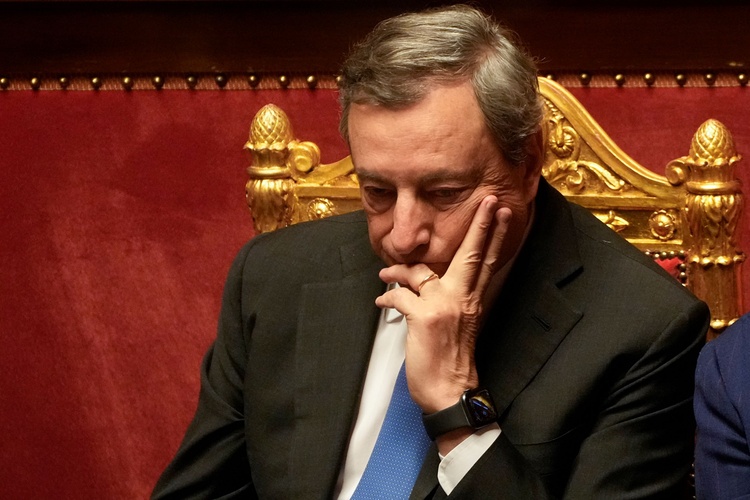The three parties that snubbed the vote included: Silvio Berlusconi’s centre-right party, Forza Italia, Matteo Salvini’s right-wing party, League, and the Five Star Movement party, headed by Giuseppe Conte.
The Forza Italia and League members did not attend the vote, while senators from the Five Star Movement did not take part, but remained in the chamber, so as to prevent the vote failing to reach quorum.
Addressing parliament, Draghi advocated for the coalition to reforge itself:
“The only path forward, if we want to stay together, is to reconstruct this pact from scratch with courage, altruism and credibility,” the prime minister said.
“Italy has a lot to say about going beyond the principle of unanimity in the EU and budget reform.
“But a strong, cohesive government is needed to do all this.
“We are in this chamber because the Italian people have asked us to be here.
“It is an answer that you must give, not to me, but to all Italian people.”
In the ensuing debate, several figures accused Draghi of seeking unrestricted powers.
The prime minister reminded the chamber that the vote was “up to them” and that he had never “asked for full powers”.
Draghi then recalled that it was Italian president Sergio Mattarella who has asked him to form a government in 2021, after the failure of the previous government to address the health, social and economic crises that Italy faced during the COVID-19 pandemic.
He emphasised that a technocrat prime minister, who “had never presented himself to voters or participated in elections” needed support from “all the political parties”.
Though Draghi won the confidence vote in the upper house by 95 to 38, the fractures within the coalition were apparent, marked by the dozens of senators who did not participate.
Foreign Minister Luigi Di Maio, who repeatedly appealed to the coalition to rally behind Draghi, stated that “politics had failed”.
“The future of the Italian people was at stake,” he continued.
“The effects of this tragic choice will be seen in the pages of history.”
The prime minister is expected to announce his resignation to the lower house of parliament on Thursday, after which, it is predicted that Mattarella will call early elections for August or September.
It is likely that Draghi will remain in his role in a caretaker capacity until the elections end.
The conservative bloc is expected to win the next election, and Brothers of Italy party leader, Giorgia Meloni, could be the next prime minister.
“I may already have a team of ministers ready,” Meloni said.
“I have my own ideas on how this nation should be governed, what should be done and what its industrial strategy should be.”
The political storm coincides with Italy’s burgeoning economic crisis, as borrowing costs have risen due to the European Central Bank tightening its monetary policy.
European Economy Commissioner Paolo Gentiloni tweeted that the coalition’s “irresponsible” move against Draghi could lead to a disaster, and predicted “difficult months ahead” for Italy.
Draghi’s potential resignation would contradict the groundswell of support for him to remain in office.
More than 1500 mayors across Italy, along with industrial groups, university deans and labour unions have written open letters to the prime minister, beseeching him to continue in his role – a move that Draghi described as “unprecedented and impossible to ignore”.











